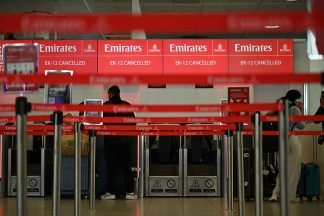In the end, it wasn’t even close.
For weeks, Plaid Cymru and Reform UK insisted the contest was neck and neck, a straight fight in what has long been one of Labour’s safest seats.
Both campaigns arrived at Caerphilly Leisure Centre saying it was too close to call. But as the ballot boxes began to stack up, the smiles on the faces of Plaid campaigners widened and Reform’s confidence visibly faded.
By the time the votes were counted, Plaid Cymru’s victory was decisive: 47%, with Reform UK trailing on 36%.
High turnout
Reform’s chairman Zia Yusuf arrived at the count before 11pm, talking of a high turnout. At 50%, that proved accurate – it was the highest turnout for any Senedd vote in Caerphilly.
Mr Yusuf suggested to me this meant either a significant tactical vote against Reform or a surge of first-time Reform voters.
It turned out to be the former. By midnight, Plaid sources were telling me they were feeling “very positive”.
Reform figures, meanwhile, looked increasingly subdued. The party had committed serious resources to the campaign, with senior figures including Richard Tice and Lee Anderson spending much of the final week here.
Party leader Nigel Farage was still knocking doors on polling day.

“Mr Caerphilly”
Alongside the political drama is a remarkable personal story.
The victor, Lindsay Whittle, first became a councillor in Caerphilly in 1976. Since 1983, he has stood at almost every Westminster and later Senedd election in Caerphilly – 14 in total.
Now, at the age of 72, the so-called “Mr Caerphilly” will finally represent his hometown in Wales’ national parliament. Clearly emotional, he dedicated his acceptance speech to Hefin David, the Labour MS whose sudden death this year prompted this by-election.
Labour’s collapse
For Labour, this result was nothing short of disastrous. Privately, their expectations had been low, but a vote share of 11% landed even below them.
Labour has never lost Caerphilly in a Welsh or UK parliamentary election since the party’s formation, winning here at every contest since 1918.
As recently as the 2021 Senedd election, they secured 47% of the vote. That dominance has been shattered.
Looking ahead
This was the final Senedd vote to be held under first-past-the-post in Wales. Next year’s election will be conducted under a proportional system where tactical voting is far less likely to shape the result, so tonight may not be a direct forecast of what’s to come.
But in what the polls show is a growing contest between Plaid Cymru and Reform to wrestle control of Wales away from Labour, Plaid has landed the first punch.
The question now is whether Reform can absorb the blow and fight back.
The challenge for Welsh Labour is finding a way back into the ring at all.
Follow STV News on WhatsApp
Scan the QR code on your mobile device for all the latest news from around the country






























